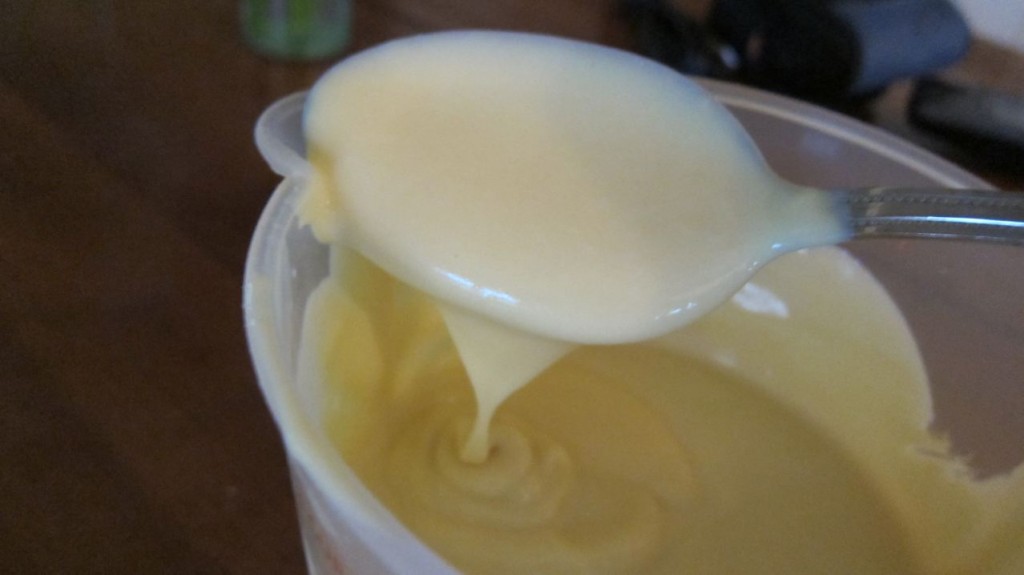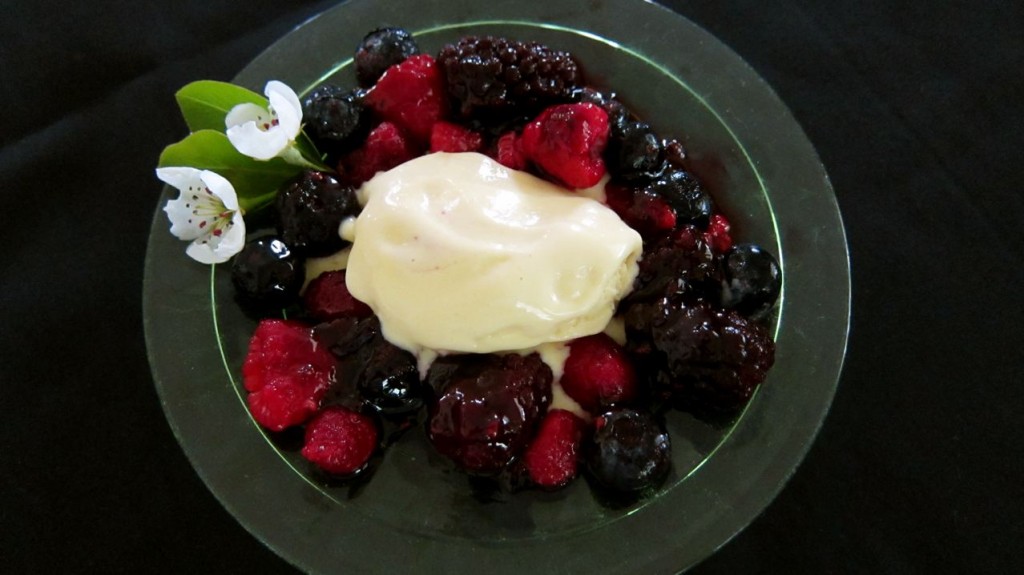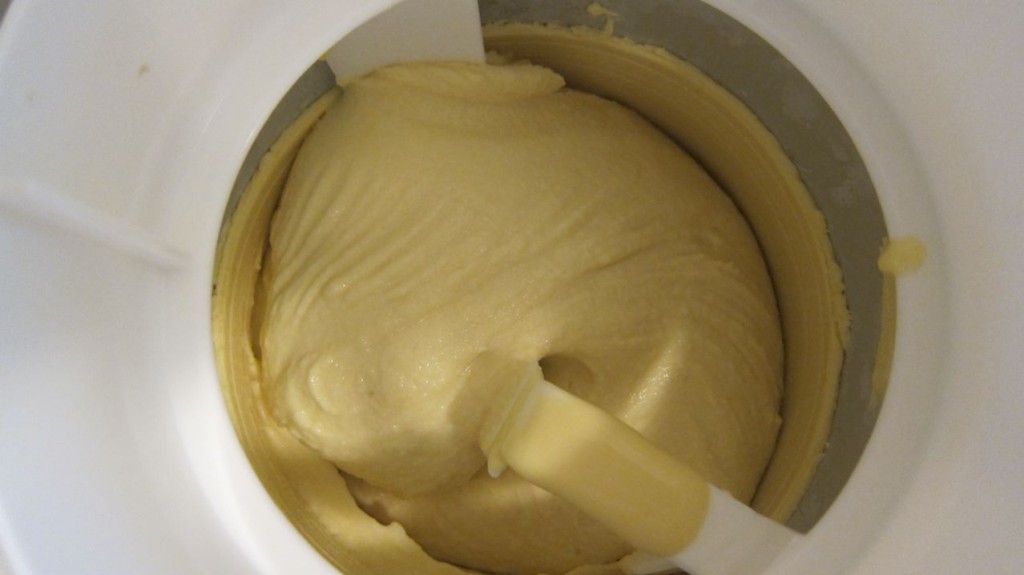Chevre Ice Cream
Chevre Ice Cream
Makes 1 Pint, Serves 6
Ice cream, a given part of American life… the part that means sweet, end- of- the- day indulgence, birthday cake’s “other half,” a required top hat for apple pie or, with the first lick of a double decker ice cream cone, an instant return to carefree childhood. From its simple beginning, making something out of extra milk before it soured, ice cream grew into a major industry with a flavor range that includes just about everything imaginable. Name it and you can find a container of it at the supermarket or a recipe on the Internet. How about a big scoop of Maple Bacon, or Curry Carrot or Black Truffle?
A wise food mentor once gave me this advice: “Always remember, in food, the line between creative and weird is very thin.”
At a favorite restaurant recently the dessert menu included “Meyer Lemon Tart with Chevre Ice Cream.” I did a quick mental tasting of chevre, which I love, combined with Meyer lemon which I also love, and decided to order the dessert, hoping it would be on the good side of that thin line.
The tart was good but more like chiffon pie than the classic lemon curd I expected (The Meyer part saved it).
The ice cream tasted good, but without the “chevre” in the title I wouldn’t have guessed it was the primary ingredient. So I decided to try to figure out how to keep the integrity of the chevre in tact and still have the ice cream taste like dessert.
Port Madison Farm White Rose Chevre Brie* flashed into my memory. Made in the style of a creamy Brie, this goat cheese from Bainbridge Island is smooth, mild, delicately tart, definitely goat, but without any acerbic after taste.
A few experiments and plenty of renditions later, this recipe emerged. It retains the essence of goat milk, offers a hint of sweetness and has a creamy texture enhanced by letting it warm up slightly before serving.
Served once with poached pear and the next time with berry crisp, it passed the test.
*Port Madison Farm is owned by Steve and Beverly Phillips. They sell at several farmers markets including Seattle’s University District and Ballard, Columbia City Farmers Market, the Bainbridge Island Farmers Market and some specialty food stores. If you can’t find this particular brand, substitute another goat Brie for the primary chevre.
Hints
- Cheese selection is crucial to the success of this dessert. Chevre has a distinct taste that includes a hint of sour. Just as you don’t expect buttermilk ice cream to taste like frozen buttermilk, you don’t want chevre ice cream to taste like frozen cheese. So you need to use a plain but refined, subtle chevre, not those much less expensive logs in most supermarket cheese cases. Port Madison Brie provided a perfect texture and subtle chevre taste that I supplemented with Laura Chenel’s plain chevre.
- Flavor balance of high quality chevre is what makes this dessert distinctive. Because every batch of cheese has its own distinctive flavor, a recipe like this cannot be absolutely precise. Cream and milk dilute the natural cheese flavor, and honey adds a gentle, round sweetness. To get the right balance, the intensity of the cheese flavor although diluted, can’t be eliminated. Honey will replace any sourness with a gentle sweetness, but too much dominates the delicate cheese flavor. Before you begin to combine the ingredients, taste the cheese and imprint the taste. Do the same thing with the honey. That way, you will add enough cheese to keep its flavor and enough honey to balance it. If you have added as much honey flavor as you think there should be but you don’t think the mixture is sweet enough, add granulated sugar. It has no flavor.
- Use a food processor to blend the ingredients into a very smooth mixture.
- This is not a stand-alone ice cream. Serve it with macerated fruit, fruit tart, fruit crisp or plain with sweet biscotti on the side.
Ingredients
All ingredients should be at room temperature.
4 egg yolks
½ cup whole milk
1 cup heavy cream
3.5 oz. chevre Brie (skin removed)
1 oz. plain, creamy chevre
4 tbs. honey
1 tsp. granulated sugar
Procedure
- Put milk, cream and cheeses in a processor and process until the mixture is completely smooth.
- Add honey and taste. It should taste of chevre, be mild and almost but not quite sweet. If it needs more sweetness or has even a slight sharp taste from the chevre, add the sugar.
- Transfer cream mixture to the top pan of a double boiler and set aside. Put water into the bottom pan, bring it to a steady low simmer and set the top pan onto the bottom pan.
- Whisk the mixture slowly and steadily until it begins to thicken. Use a rubber spatula to scrape down any custard that begins to stick to the side of the pan. When it is thick, the consistency of slightly runny pudding, take the pan out of the water and set it off heat.
- Transfer the custard to a non-metallic bowl. Cover by placing plastic wrap directly onto the custard, to avoid a skin forming. Refrigerate until the custard is cold and has set up almost completely, approximately 4 hours or overnight.
- Transfer the cold custard to the bowl of an ice cream maker and follow the manufacturer’s directions to make it into ice cream.
- Because homemade ice cream made with cheese tends to freeze harder than normal, take it out of the freezer 15- 20 minutes before serving so it softens to the consistency of soft ice cream. Serve immediately.

Slightly softer than traditional custard, the chilled chevre custard is ready to go into the ice cream maker.

